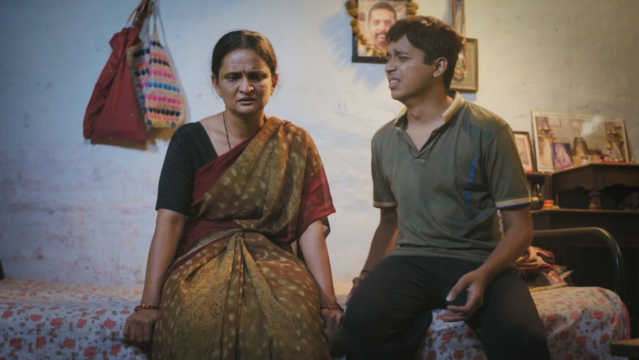
Suyog Zore
Mumbai, 29 Jun 2021 12:51 IST
Updated: 02 Jul 2021 0:39 IST
Siddharth Menon and Nehha Pendse Bayas deliver terrific performances in this emotionally charged film about confronting your demons.

On paper, June is a pretty straightforward story of two flawed individuals haunted by their mistakes who come together to heal each other. But the poignant performances by the leads, Nehha Pendse Bayas and Siddharth Menon, and the layered direction by first-time helmer duo Suhrud Godbole and Vaibhav Khisti make this film an emotional rollercoaster ride that also has an important message about facing your demons instead of running away from them.
In a strange way, June is also a coming-of-age story where two strangers, who have nothing in common, slowly learn to accept the truth about themselves and help each other grow into better human beings. However, writer Nikhil Mahajan and the directors add a unique own twist to the tale — the couple is not romantically involved.
Menon is Neel, a 21-year-old frustrated youngster who is always at loggerheads with his father because of his poor academic performance. Neel has failed his engineering exam and now has to spend a year doing nothing. But he is also experiencing trauma that he is not ready to share with anyone, even his girlfriend Nikki (Resham Shrivardhan) with whom he has a strained relationship. He is by no means a good human being. He is Islamophobic, treats his girlfriend like trash, and has absolutely no control over his rage.
June is one of those projects that gave me complete fulfilment, says Siddharth Menon
Neha (Pendse) is a married woman who has come to Aurangabad, her husband's childhood hometown. She pretends to have complete control over her emotions. But behind her no-nonsense tough woman facade, is a fragile soul who is struggling to come to terms with a mistake she may or may not have committed.
As they meet and form a friendship, they realize that they both are facing some kind of trauma which they are hiding from the rest of the world. The pacing is deliberately slow to allow the viewers to get a sense of their emotional state. With each scene, each dialogue, we understand their characters and where they are coming from a little better.
They talk, share their views on relationships, agree on some issues, disagree on others and even fight; but in the end, they make up because both are aware that they are the only two people who can understand each other.

Menon and Pendse embrace and inhabit their characters’ flaws and foibles. The actor completely embodies the character of a boy who is guilt-ridden and is pushing everyone away. Neel is not a likeable person, in fact, for the most part, he comes across as an awful guy with very few redeeming qualities. But despite this, because of Menon's empathetic portrayal of the character, we never despise him. It's a tight rope to walk, where you want the audience to condone the actions of your character but not despise him. Menon, with the able direction of Godbole and Khisti, pulls it off without a hitch.
Godbole, in an interview with Cinestaan.com earlier this year, had said that Nehha was going to surprise everyone and she does. This is easily her best performance. She does an outstanding job portraying an emotional turmoil of a person who has to act as a guiding force for someone else when she herself is broken inside.
Kiran Karmarkar as Neel's father is both wonderful and awful in every way that parents observing their children slowly losing their way can be. He is hurt because of his son's failure despite his taking an educational loan. But it's not just that. He is more upset with the fact that his son is slowly drifting away and he can't do anything to repair the bond they once shared.
For the most part, the film never shifts focus from its main theme — learning to forgive yourself — except for one minor subplot about moral policing which comes across as tacky and more of an afterthought.
The film also has a poignant score by Shalmali Kholgade but it's the lack of music that makes the most impact. The absence of a background score during emotionally charged exchanges and deep emotional conversations heightens the impact of these scenes.
Because June is about the terrible process of coming to terms with your past, one would think it would make for uncomfortable or uninteresting viewing. But the performances are so good and the story is so complex that it, in the end, makes a startlingly and deeply humanist statement.
Related topics
Planet Marathi OTTYou might also like

Review Marathi
Samaira review: This well-intentioned travel drama suffers from a dull script
Actor Rishi Deshpande's directorial debut doesn't rise as much as its performances. ...

Review Marathi
Goshta Arjunchi review: Triggering conversations about mental health
Anupam Barve’s short film urges people to talk to their families about what they are going...

Review Marathi
Ekda Kaay Zala review: Sumeet Raghvan impresses in a film that does not use its full potential
Directed by Dr Saleel Kulkarni, the film has a fine act by child artiste Arjun Purnapatre....

